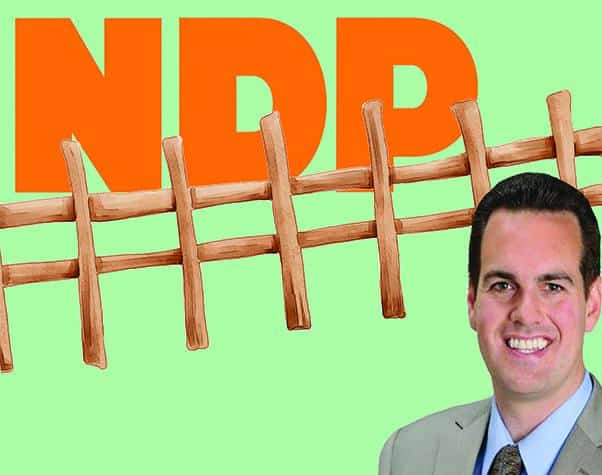Why Erin Weir’s removal from the NDP was the right call

author: taylor balfour | news writer

jeremy davis
Here’s the thing about sexual assault: nobody likes to report it. For the victim, it’s embarrassing, life-threatening, and often opens the door to public criticism.
When someone claims sexual assault, the general public immediately gets involved. Victims are often pressured into taking legal action even though – and rightfully so – all victims have a right to not file a report of their assault. Still, when someone speaks publicly about their abuse, the world gets involved in their privacy.
This is even worse when it comes to sexual assault or harassment. Not only is the public suddenly interested in the victim taking legal action, but they also want more details about what happened; they want the victim to speak further on the matter. It’s a mortifying process. This is why, in the case of Erin Weir, those who have spoken out against him should be believed.
Publicly speaking to an audience about sex acts is embarrassing, to say the least. It’s an intimate subject, and if you were forced to speak publicly on it, it would feel like an invasion of privacy to have the public drilling into the specifics. It’s even worse, however, when this intimate subject turns to violence against you. This couples the same embarrassment about a public discussion of intimacy with being forced to relive a trauma over, and over, and over again.
No one who has been sexually assaulted enjoys going through such an ordeal. So, despite the fact that yes, there are sometimes false assault accusations, a majority of sexual assault accusations should be believed, as the act of coming out publicly and stating that they happened is opening the door for all that trauma. The same, of course, goes for the embarrassment of reporting sexual harassment.
If anything, the stakes are higher when sexual harassment occurs in the workplace. Not only is reporting in general atrocious, but in the workplace, the victim will need to return to that same work environment where the harassment took place, and may very well continue.
A victim coming forward is a difficult but brave decision, and is made when all the potential consequences seem lesser compared to living knowing that the individual is still punishment-free. This, of course, is why Erin Weir being removed from the NDP in consequence of his actions, is the correct move.
When being hired for a job, an employer wants to hire individuals who make their company or organization look good. They want someone who will work hard, will be a positive presence in the workplace, and will be a positive representative for them in the eye of the public. If you have hired someone who has not upheld these ideals, the employer has the complete and total right to fire them. This is the case with Erin Weir.
First, let’s acknowledge some facts. Not just one individual has accused Weir of sexual harassment, three have. This isn’t including the one count of regular harassment that has also been found against him.
In a statement released by NDP president Jagmeet Singh, he states that after the investigation into Weir’s actions, it was found that “when Mr. Weir was told his advances were unwanted, he stopped.”
Good on him. However, this doesn’t change the fact that the NDP’s name has been tainted. It is known that the NDP hired someone who is a known sexual harasser, regardless of whether that harassment stopped. The entirety of this taints the NDP’s name and is quite obviously not what an employer wants when hiring an employee.
However, this isn’t why he was removed. Singh also reported that “recent developments demonstrate Mr. Weir is unwilling to take appropriate responsibility for his actions.” He continues to state that he then “informed Mr. Weir of [his] decision to remove him from caucus, effective immediately.”
What he is referring to, of course, is that when Weir spoke to the media about the harassment claims, not only did he publicly identify one of his victims, but he claimed that his actions were “trumped up.” After being scolded for his media interview by his party, Weir then claimed that the reason the NDP were upset wasn’t because of what he stated in the interview. Rather, Weir claimed that his party was upset with him because he talked to the media at all. Weir is blatantly misrepresenting the real reason his party is upset with him, and is attempting to make himself look like a victim in all of this.
To be blatant, I don’t understand why people claim that Weir’s release is unfair. Weir harassed not one, not two, but three individuals. When told his advances were unwelcomed, he stopped, but still was “unwilling to take appropriate responsibility.” Thanks to that, he was removed from caucus. What, may I ask, has been poorly handled?
Let’s look at it from a different perspective: Bob steals a cookie from three of his coworkers every day. His coworkers tell him to stop, and realizing that he’s bothering them, he does. When told that he should know that stealing cookies is wrong to begin with, he deflects the blame and refuses to take responsibility for doing something wrong. Because of that, his office removes him, fearing that a similar instance may repeat in the future. If that’s an acceptable response, then the same goes for a case dealing with sexual assault.
Weir’s inability to take responsibility for his actions leaves the door open for him to repeat them. We learn nothing from history if we fail to acknowledge that it happened, and when Weir is ready to acknowledge it, good for him. It still won’t get him his seat back, but at least he will have learned the value of honesty.









